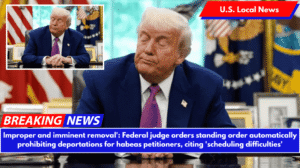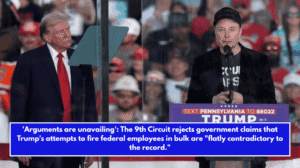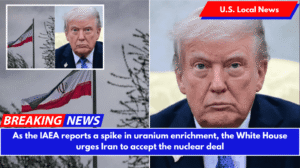On Friday, the Public Broadcasting Service (PBS) and a Minnesota affiliate sued President Donald Trump in a federal court in Washington, D.C., over his controversial plans to cut federal funding.
On May 1, the 45th and 47th Presidents issued Executive Order 14290, titled “Ending Taxpayer Subsidization of Biased Media.” The order states that neither PBS nor National Public Radio (NPR) provide “a fair, accurate, or unbiased portrayal of current events to taxpaying citizens.”
In turn, Trump’s order instructs the Corporation for Public Broadcasting Board of Directors (CPB Board) “and all executive departments and agencies” to discontinue funding for NPR and PBS.
In a 35-page complaint, PBS and Lakeland PBS claim that the “unprecedented presidential directive” targeting them and other member stations “will upend public television,” and they refute the “charged assertions” made in Trump’s order.
The lawsuit also claims that Trump’s attempt to defund them lacks a legal basis.
“[R]egardless of any policy disagreements over the role of public television, our Constitution and laws forbid the President from serving as the arbiter of the content of PBS’s programming, including by attempting to defund PBS,” according to the petition.
The plaintiffs are requesting that the court enjoin Trump’s funding rescission as a violation of federal law establishing public airwaves and unconstitutional under the First Amendment.
“[S]ince Congress laid the foundations for the growth of public television over 50 years ago, it has repeatedly protected the flow of federal funds from political interference by filtering them through a non-federal, non-profit, and nonpartisan entity,” the accusation states.
The filing goes on to cite a section of the original legislation that established the CPB in 1967, creating PBS in 1969, and was quickly amended to include NPR in 1970.
“Lest there be any doubt that the Executive Branch should have no power to influence CPB’s decision-making, Congress enacted a specific ‘[p]rohibition’: no ‘department, agency, officer, or employee of the United States’ may ‘exercise any direction, supervision, or control over public telecommunications, or over [CPB] or any of its grantees’—including with respect to ‘the content or distribution of public telecommunications programs and services,'” according to the complaint.
The plaintiffs openly accuse the Trump administration of unconstitutionally targeting them for disfavored speech.
From the complaint, in length:
The EO makes no attempt to hide the fact that it is cutting off the flow of funds to PBS because of the content of PBS programming and out of a desire to alter the content of speech. That is blatant viewpoint discrimination and an infringement of PBS and PBS Member Stations’ private editorial discretion. The EO also seeks to impose an unconstitutional condition on PBS Member Stations’ receipt of federal funds by prohibiting them from using federal funds to access PBS programming and services. And the EO smacks of retaliation for, among other things, perceived political slights in news coverage. That all transgresses the First Amendment’s protection of both speech and freedom of the press.
While five of the lawsuit’s seven counts allege First Amendment violations, the complaint’s main point is that the president lacks the authority to carry out his orders. Furthermore, the plaintiffs allege that Trump is aware that his efforts are unsupported.
“Notably, the President contemplated attempting a formal rescission of funds to PBS and PBS Member Stations under the [Impoundment Control Act],” the lawsuit states. “But rather than engaging in that process, which preserves the separation of powers with respect to congressional appropriations, the President acted unilaterally to purport to force CPB and other federal actors to alter the decades-long flow of funds to PBS and eliminate PBS Member Stations’ statutorily protected discretion as to how best to use federal funds to effectuate the goals of the Act.”
The lawsuit also provides additional evidence to support the claim that Trump intentionally sought to exceed his available power.
“The first sentence of the EO makes plain that the President is attempting to circumvent Congress,” the lawsuit reads. “The EO begins by stating that the reasons that motivated Congress to enact the Act, ‘[u]nlike in 1967,’ do not apply today. However, whether the Act continues to be good policy is up to Congress, which has consistently appropriated funds under the Act.
The plaintiffs argue that public broadcasting’s long-term viability is unquestionable – until Congress says otherwise. And the lawsuit claims that the presence of PBS in American life is worth the money spent.
The lawsuit justifies the PBS budget in a variety of ways:
PBS and PBS Member Stations have fulfilled that mission by providing commercial-free, educational television programing and services that reflect the interests of the American people. Their informative, enriching content is free to the public and available to nearly 97% of the United States’ population, serving parts of the country not profitable for commercial media.
The demographic composition of PBS’s audience mirrors the overall U.S. population with respect to geography, income, education, race, and ethnicity. Sixty percent of PBS viewers live outside of urban areas. The breakdown of viewers is almost evenly split among Democrats, Republicans, and independents…
PBS reaches more children, and more parents of young children, than any other children’s television network. PBS KIDS is a dedicated children’s media service that delivers free educational content via television and digital platforms, including PBS Member Stations, the 24-hour PBS KIDS channel and live stream, pbskids.org, and the PBS KIDS Video and Games apps.
“If allowed to stand, the EO would override Congress’s decision to remove the administration of federal funding for public television from the government’s editorial purview,” according to the lawsuit. “And it would have a significant impact on PBS and its member stations’ ability to provide a diverse range of programming to all Americans.
PBS and Lakeland PBS are suing to protect their ability to serve their viewers and communities without political interference, as both Congress and the First Amendment require.”













